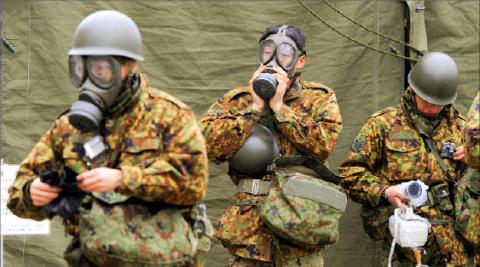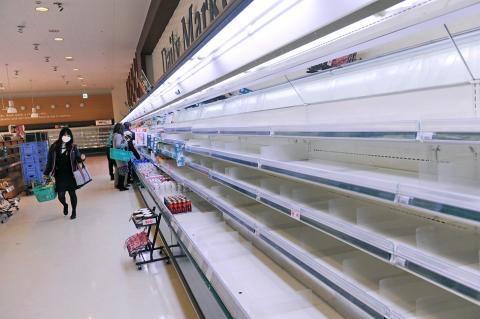Japan faced a potential catastrophe yesterday after a quake-crippled nuclear power plant exploded and sent low levels of radiation floating toward Tokyo, prompting some people to flee the capital and others to stock up on essential supplies.
Japanese Prime Minister Naoto Kan urged people within 30km of the facility — a population of 140,000 — to remain indoors amid the world’s most serious nuclear accident since the Chernobyl disaster in Ukraine in 1986.
Officials in Tokyo — 240km to the south of the plant — said only minute levels of radiation had been detected so far in the capital, which were “not a problem.”

Photo: Reuters
Radiation levels in the city of Maebashi, 100km north of Tokyo, and in Chiba Prefecture, nearer the city, were up to 10 times normal levels, Kyodo news agency said. Foreign experts disagreed on whether this was harmful or not.
About eight hours after the explosions, the UN weather agency said winds were dispersing radioactive material over the Pacific Ocean, away from Japan and other Asian countries. The Geneva-based World Meteorological Organisation added that weather conditions could change.
Two of the reactors exploded on Tuesday at the Fukushima Dai-ichi plant after days of frantic efforts to cool them. Kyodo news agency said the nuclear fuel pool at the No. 4 reactor might be boiling, suggesting the crisis is far from over at the plant.

PHOTO: AFP
“The possibility of further radioactive leakage is heightening,” a grim-faced Kan said in an address to the nation. “We are making every effort to prevent the leak from spreading. I know that people are very worried, but I would like to ask you to act calmly.”
Levels of 400 millisieverts per hour had been recorded near the No. 4 reactor, the government said. Exposure to more than 100 millisieverts a year is a level which can lead to cancer, according to the World Nuclear Association.
The plant operator pulled out 750 workers, leaving just 50, and a 30km no-fly zone was imposed around the reactors. There have been no detailed updates on what levels the radiation reached inside the exclusion zone where people live.
“Radioactive material will reach Tokyo but it is not harmful to human bodies because it will be dissipated by the time it gets to Tokyo,” said Koji Yamazaki, professor at Hokkaido University graduate school of environmental science. “If the wind gets stronger, it means the material flies faster, but it will be even more dispersed in the air.”
Despite pleas for calm, residents rushed to shops in Tokyo to stock up on supplies. Don Quixote, a multi-storey, 24-hour general store in Roppongi district, sold out of radios, flashlights, candles and sleeping bags.
In a sign of regional fears about the risk of radiation, China said it would evacuate its citizens from areas worst affected, but it had detected no abnormal radiation levels at home. Air China said it had canceled flights to Tokyo.
Several embassies advised staff and citizens to leave affected areas. Tourists cut short vacations and multinational companies either urged staff to leave or said they were considering plans to move outside Tokyo.
“I’m scared. I’m so scared I would rather be in the eye of a tornado,” said 10-year-old Lucy Niver of Egan, Minnesota, who was on holiday in Japan. “I want to leave.”
Japanese media have became more critical of Kan’s handling of the disaster and criticized the government and nuclear plant operator Tokyo Electric Power Co (TEPCO) for its failure to provide enough information on the incident.
Kan himself lambasted the operator for taking so long to inform his office about one of the blasts, demanding to know “what the hell is going on,” Kyodo reported.
Kyodo said Kan had ordered TEPCO not to pull employees out of the plant.
“The TV reported an explosion, but nothing was said to the premier’s office for about an hour,” a Kyodo reporter quoted Kan telling power company executives.
There have been a total of four explosions at the plant since it was damaged in Friday’s massive quake and tsunami. The most recent were blasts at reactors No. 2 and No. 4.
There was a real possibility of a leak in the No. 4 reactor container, which houses the nuclear fuel rods, according to Murray Jennex, a professor at San Diego State University in California.
Concerns center on damage to a part of the reactor core known as the suppression pool, which helps cool and trap the majority of cesium, iodine and strontium in its water. The nature of the damage was unclear, as was its impact on the containment structure, a thick steel vessel that surrounds the core.
The full extent of the destruction from last Friday’s magnitude 9.0 earthquake and tsunami that followed it was still becoming clear, as rescuers combed through the region north of Tokyo where officials say at least 10,000 people were killed.
Whole villages and towns have been wiped off the map by Friday’s wall of water, triggering an international humanitarian effort of epic proportions.

AIR SUPPORT: The Ministry of National Defense thanked the US for the delivery, adding that it was an indicator of the White House’s commitment to the Taiwan Relations Act Deputy Minister of National Defense Po Horng-huei (柏鴻輝) and Representative to the US Alexander Yui on Friday attended a delivery ceremony for the first of Taiwan’s long-awaited 66 F-16C/D Block 70 jets at a Lockheed Martin Corp factory in Greenville, South Carolina. “We are so proud to be the global home of the F-16 and to support Taiwan’s air defense capabilities,” US Representative William Timmons wrote on X, alongside a photograph of Taiwanese and US officials at the event. The F-16C/D Block 70 jets Taiwan ordered have the same capabilities as aircraft that had been upgraded to F-16Vs. The batch of Lockheed Martin

GRIDLOCK: The National Fire Agency’s Special Search and Rescue team is on standby to travel to the countries to help out with the rescue effort A powerful earthquake rocked Myanmar and neighboring Thailand yesterday, killing at least three people in Bangkok and burying dozens when a high-rise building under construction collapsed. Footage shared on social media from Myanmar’s second-largest city showed widespread destruction, raising fears that many were trapped under the rubble or killed. The magnitude 7.7 earthquake, with an epicenter near Mandalay in Myanmar, struck at midday and was followed by a strong magnitude 6.4 aftershock. The extent of death, injury and destruction — especially in Myanmar, which is embroiled in a civil war and where information is tightly controlled at the best of times —

China's military today said it began joint army, navy and rocket force exercises around Taiwan to "serve as a stern warning and powerful deterrent against Taiwanese independence," calling President William Lai (賴清德) a "parasite." The exercises come after Lai called Beijing a "foreign hostile force" last month. More than 10 Chinese military ships approached close to Taiwan's 24 nautical mile (44.4km) contiguous zone this morning and Taiwan sent its own warships to respond, two senior Taiwanese officials said. Taiwan has not yet detected any live fire by the Chinese military so far, one of the officials said. The drills took place after US Secretary

THUGGISH BEHAVIOR: Encouraging people to report independence supporters is another intimidation tactic that threatens cross-strait peace, the state department said China setting up an online system for reporting “Taiwanese independence” advocates is an “irresponsible and reprehensible” act, a US government spokesperson said on Friday. “China’s call for private individuals to report on alleged ‘persecution or suppression’ by supposed ‘Taiwan independence henchmen and accomplices’ is irresponsible and reprehensible,” an unnamed US Department of State spokesperson told the Central News Agency in an e-mail. The move is part of Beijing’s “intimidation campaign” against Taiwan and its supporters, and is “threatening free speech around the world, destabilizing the Indo-Pacific region, and deliberately eroding the cross-strait status quo,” the spokesperson said. The Chinese Communist Party’s “threats